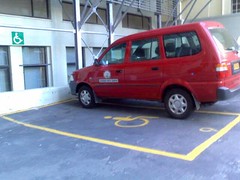This following scenario recently happened with a client of ours. I shall not name the client as I believe that would be unprofessional, but what we found was a staggering example of how an employer can build barriers to accessibility, and therefore to inclusion.
The nameless client wanted us (as part of a bigger job) to look at a specific individual, and to recommend any "reasonable accommodations" that they should make in order to meet their obligations under the terms of the Employment Equity Act. Usually we don't get involved at the personal level like this, but rather we conduct building wide audits, addressing the inaccessibility of the building to all users.
Anyway, in this example I met 'John' (I have changed his name). John is a fairly new employee working for a large employer. John happens to be blind, and is employed as...(can you guess)...(yep, go on have a stab...remembering that John is Blind...)...a telephonist (so no big surprises there, hey?). But still, let's give the employer the benefit of the doubt, after all no one else was looking to employ John in any other capacity. Now, the company gave him a nice office, desk, telephone, and computer. All of the internal messaging is done through the computer; so it is quite essential for his job. John had prepared for employment by learning to use a very common screen reader called JAWS. The employer knew that they had to get John a copy of JAWS. But then the inaccessibility of the institution set in. They could not just provide him with one (as should be the case...after all they provide screens to those people who need to use a screen to access their computer, don't they?). But they had to put an order into Head Office. Head Office then sat on the order...not for a week, or even a month...but for over 3 months!! This had to fit into their purchasing procedures... So John sat with a useless computer for 3 months! Eventually they were able to get a copy, but this had to come through their preferred software supplier. Now JAWS costs +/- R9000 in South Africa. But their software supplier (Siemens) chose to charge them nearly 3 times this price!!! We were staggered, and pointed out this 'anomaly' to our client...who shrugged their collective shoulders...and paid the money. Maybe I should say one more thing - this client is a Government department...so it is not their money, but ours!!
I am angry about this as JAWS should have been provided on the same day that John commenced his employment.
I am angry about this as someone decided to make a killing on selling this software (I once had a client you was charged R80,000 for the same software!!), to the detriment of a disabled person.
I am angry because the client could not see the inequity of his ways.
I don't need to have the reasonable accommodation of providing seating (as I come with my own). But most other people I see in offices appear to require that accommodation. They don't have to stand for 3 months, before someone in head office completes an order for a new seat for them.
In fact I believe that screen readers should be part of the operating system (no; I don't count MS Narrator as a true screen reader). I understand that the newer Mac operating systems have this. Surely the software companies are being discriminatory by only providing a Graphical User Interface (GUI)?












